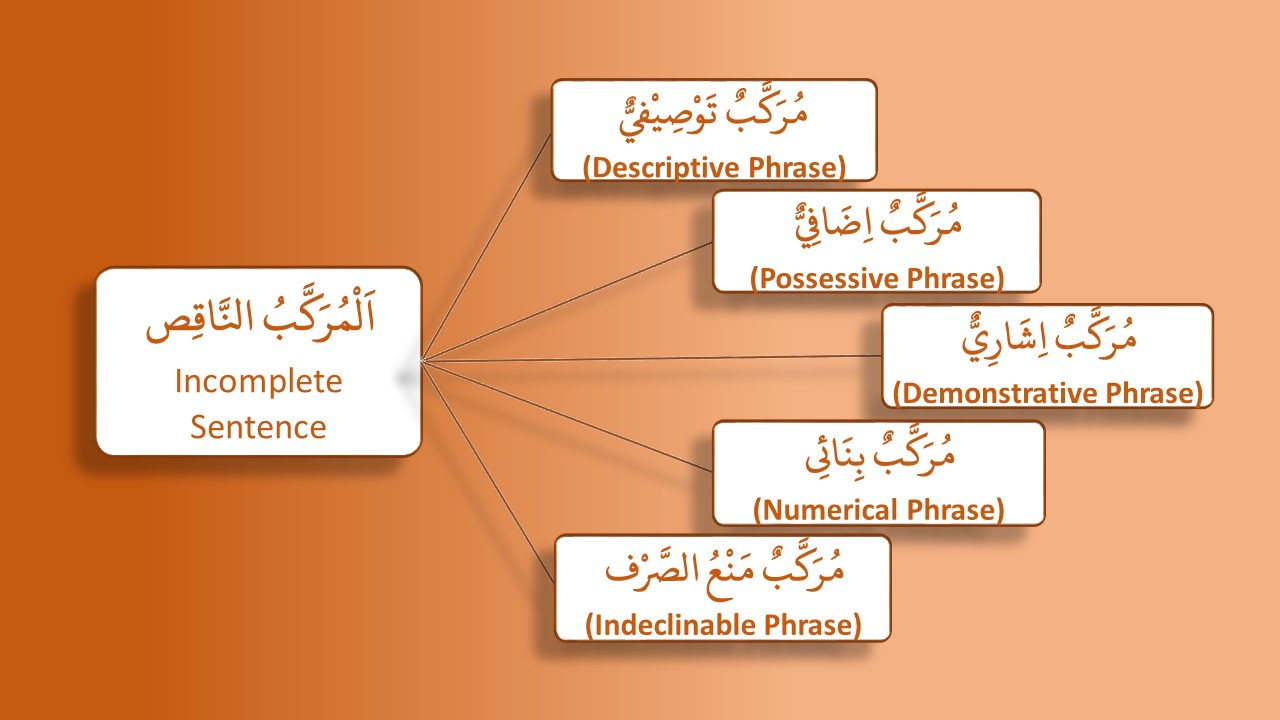5 Critical Kinds of Incomplete Sentence
As mentioned in one of the posts, that sentences are of two types; complete sentences and Incomplete. In this post, we will understand what are incomplete sentences? What are different kinds of incomplete sentences? With examples.
Incomplete sentences or phrases, are called اَلْمُرَكَّبُ النَّاقِص or الجُملَة الْغَيْرُالْمُفِيْدَة. Incomplete sentences are those kind of sentences which do not give complete sense or complete information. Therefore, that sentence requires another phrase or word to create a complete sense.
For instance, if someone says أَحَدَ عَشَرَ رِيَالاً (which means 11 Riyaal) and leave it be, no one would be able to understand what the speaker meant. Did he ask for 11 Riyaal? or Did he want to spend 11 Riyaal? or what? I believe the above example of أَحَدَ عَشَرَ رِيَالاً (11 Riyaal) gave a good picture of what the incomplete sentences are.
So, in the above example أَحَدَ عَشَرَ رِيَالاً is a phrase which requires addition of another word or phrase to give complete sense.
Incomplete Sentences or phrases are of 5 types:
- مُرَكَّبٌ تَوْصِيْفيٌّ (Descriptive Phrase)
- مُرَكَّبٌ اِضَافِيٌّ (Possessive Phrase)
- مُرَكَّبٌ اِشَارِيٌّ (Demonstrative Phrase)
- مُرَكَّبٌ بِنَائِى (Numerical Phrase)
- مُرَكَّبٌ مَنْعُ الصَرْف (Indeclinable Phrase)
Let’s take a look on all the 5 kinds with examples.
مُرَكَّبٌ تَوْصِيْفيٌّ (Descriptive Phrase)
It is a kind of incomplete sentence or phrase where one word or some words describe another word. The describing word or words are called صِفَةٌ and the word being describes is called مَوْصُوْفٌ.
e.g. رَجُلٌ صَالِحٌ (a pious man). In this example, the word رَجُلٌ is being described, so, it is مَوْصُوْفٌ. While, the word صَالِحٌ is describing the word رَجُلٌ ,so, it is صِفَةٌ.
One can understand easily that the above phrase is only giving it meaning but to create a complete sense, it requires another word or phrase. For instance, if we add name of a person as subject, like,‘زيد’ and say زيد رَجُلٌ صَالِحٌ. Now, the sentence is complete and it is giving complete information that ‘Zaid is a pious man’.
مُرَكَّبٌ اِضَافِيٌّ (Possessive Phrase)
It is a phrase where second word possesses, owns or relates to the first word. Word which possesses another word is called مُضَافٌ اِلَيْه (possesser) and the word being possessed is called مُضَافٌ (possessed).
This combination is known as مُرَكَّبٌ اِضَافِيٌّ (Possessive Phrase).
There are certain conditions for this combination, which are:
-the مُضَافٌ (possessed) will never get ألْ or Tanween ( -ً , -ٌ, -ِ).
-the مُضَافٌ اِلَيْه (possesser) will always be مَجْرُوْر (Genetive case). [Don’t stress with these terms. You will get to know soon. Right now, just focus on the given information].
There are some other conditions and situations for the ‘possessive phrase’ combination. As for now, this is more than enough.
e.g. كِتَابُ زَيْدٍ (Book of Zaid or Zaid’s book). In this example, second word which is زَيْدٍ possesses the first word which is كِتَابُ . So, زَيْدٍ is مُضَافٌ اِلَيْه (possesser) and كِتَابُ is مُضَافٌ (possessed)
مُرَكَّبٌ اِشَارِيٌّ (Demonstrative Phrase)
It is that kind of phrase or incomplete senetence where one nounpoints towards another noun. The pointining noun is called اسْم اشَارَة and the noun being pointed is called مُشَارٌ اِلَيْه . In this form of phrasal combination, مُشَارٌ اِلَيْه (the noun being pointed) must have an ال. Because, if مُشَارٌ اِلَيْه does not have an ال, this sentence would be a complete sentence. Don’t get congused!! This will get clear in the coming examples.
e.g. هَذَا الرَّجُلُ (This man) In this example, the noun هَذَا is اسْم اشَارَة and the noun الرَّجُلُ is مُشَارٌ اِلَيْه. The noun هَذَا is being used to point out at الرَّجُلُ . Now, you can understand that the senetence is not complete and it is requiring another word or phrase to display a sensible meaning.
Similarly, if you look at مُشَارٌ اِلَيْه which is الرَّجُلُ in the given example, you can clearly see that it is starting with ال which is the condition for this kind of phrasal combination. If there was no ال at الرَّجُلُ , the sentence would be like this هَذَا رجُلٌ (This is a man). So, هَذَا is ْمُبتَدَاء and رجُلٌ is خَبر which make the combination a complete sentence. As you saw, with just a small change, the whole phrasal combination is changed into a complete sentence. This combination will be no more considered مُرَكَّبٌ اِشَارِيٌّ (Demonstrative Phrase), instead, a complete sentence.
مُرَكَّبٌ بِنَائى (Numeral Phrase)
It is a kind of incomplete sentence where two numerals are joined together to form a single word. A حرف originally linked the two words but it is omitted and cannot be seen in writing or heard in listening.
This kind of phrase is only found in Arabic numbers from 11 to 19. Both the parts of this kind of incomplete sentence are in مفتوح except number 12. Like, اَحدَ عشرَ, ثلاثةَ عشرَ, خمسةَ عشرَ etc.
مُرَكَّبٌ مَنْعُ الصَرْف (Indeclinable Phrase)
It is a kind of incomplete sentence where two separate words are joined together to form a completely new single word. The two words are joined together without using any joining letteror particle.
The first part of this incomplete sentence is always مفتوح. But, the second part changes its اعراب according to the عامل (changing factor).
For instance, the word حضرموت (name of a city in Yemen) is orginally two words; حضر and موت . These two words have different meaning in separate, but they were joined together to name the city of Yemen. Now, this word حضرموت is not creating any sense until it is used with some other phrase. This is the last kind of incomplete sentences.
In conclusion, incomplete sentences are of 5 kinds. All these kinds are constantly used in Arabic language. Though, incomplete sentences do not develop a complete sense until they are used with other sentences and phrase, but, still they are major and integral parts of any Arabic sentences.
Developing a better understanding of all these 5 kinds of incomplete sentence, will accelerate the understanding of Arabic language. If you want to gain more knowledge on this topic with the help of interactive practice work, go attempt this <a href=”https://quizlet.com/112219792/types-of-phrases-and-sentences-flash-cards/”>flash card activity</a> (https://quizlet.com/112219792/types-of-phrases-and-sentences-flash-cards/) on quizlet.com.

